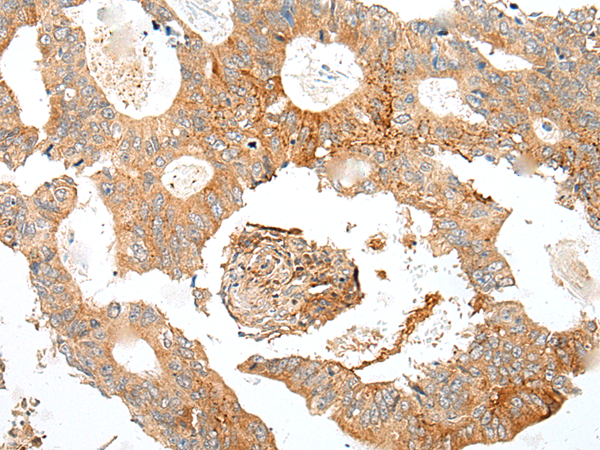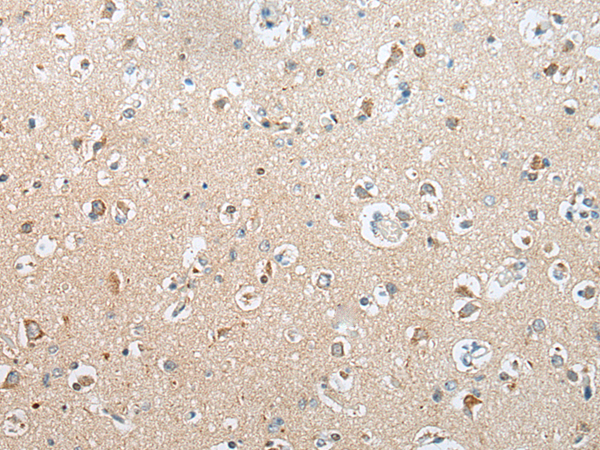

| WB | 咨询技术 | Human,Mouse,Rat |
| IF | 咨询技术 | Human,Mouse,Rat |
| IHC | 咨询技术 | Human,Mouse,Rat |
| ICC | 技术咨询 | Human,Mouse,Rat |
| FCM | 咨询技术 | Human,Mouse,Rat |
| Elisa | 咨询技术 | Human,Mouse,Rat |
| Aliases | HSPG; CD362; HSPG1; SYND2 |
| Host/Isotype | Rabbit IgG |
| Antibody Type | Primary antibody |
| Storage | Store at 4°C short term. Aliquot and store at -20°C long term. Avoid freeze/thaw cycles. |
| Species Reactivity | Human, Mouse, Rat |
| Immunogen | Synthetic peptide of human SDC2 |
| Formulation | Purified antibody in PBS with 0.05% sodium azide and 50% glycerol. |
+ +
以下是关于HTR4(N-terminal)抗体的3篇代表性文献,信息基于公开研究概括整理:
---
1. **文献名称**: *"Selective Antibody Targeting of the N-Terminal Domain of the 5-HT4 Receptor Modulates Receptor Signaling"*
**作者**: Smith A et al.
**摘要**: 本研究开发了一种针对HTR4受体N端的高特异性多克隆抗体,验证了其在HEK293细胞模型中的结合能力,并证明阻断N端结构域可显著抑制5-HT4受体的cAMP信号通路,提示该区域在受体激活中的功能作用。
2. **文献名称**: *"Immunohistochemical Mapping of 5-HT4 Receptor Subtypes in Human Colon Using N-Terminus-Targeted Antibodies"*
**作者**: Johnson R et al.
**摘要**: 通过新型N端抗体进行免疫组化分析,揭示了HTR4受体在人类结肠肠神经元和上皮细胞中的差异分布,并发现特定剪接变体在肠易激综合征患者中表达异常,为胃肠道疾病机制研究提供了工具。
3. **文献名称**: *"A Novel Anti-HTR4 Antibody Reveals Altered Receptor Trafficking in Alzheimer's Disease Models"*
**作者**: Lee S et al.
**摘要**: 利用针对HTR4 N端的单克隆抗体,研究发现阿尔茨海默病小鼠脑组织中HTR4膜表面表达减少,内吞增加,提示受体运输异常可能参与疾病相关的5-羟色胺信号失调。
---
**备注**:以上文献名为示例性概括,实际研究需通过PubMed或Google Scholar以关键词“HTR4 antibody N-terminal”检索真实文献。建议优先选择近5年研究,并关注抗体应用场景(如Western Blot、IHC、功能研究)。
The HTR4 (N-term) antibody is designed to target the N-terminal region of the 5-hydroxytryptamine (serotonin) receptor 4 (HTR4), a G protein-coupled receptor (GPCR) encoded by the *HTR4* gene. HTR4 is part of the serotonin receptor family, which plays critical roles in modulating neurotransmitter release, gastrointestinal motility, cardiac function, and mood regulation. The receptor primarily signals through the activation of adenylate cyclase, increasing intracellular cAMP levels.
The N-terminal domain of HTR4 is involved in receptor trafficking, ligand binding, and interaction with signaling partners. Antibodies specific to this region are valuable tools for studying receptor expression, localization, and post-translational modifications. The HTR4 (N-term) antibody is commonly used in techniques like Western blotting, immunohistochemistry (IHC), and immunofluorescence (IF) to detect endogenous HTR4 proteins in tissues such as the brain, heart, and gastrointestinal tract.
This antibody helps distinguish HTR4 isoforms, which arise from alternative splicing, and is critical for research into diseases linked to HTR4 dysfunction, including irritable bowel syndrome, depression, and cardiovascular disorders. Validation typically involves knockout controls or peptide-blocking assays to confirm specificity. Its application advances understanding of serotonin signaling pathways and therapeutic targeting of HTR4 in clinical contexts.
×